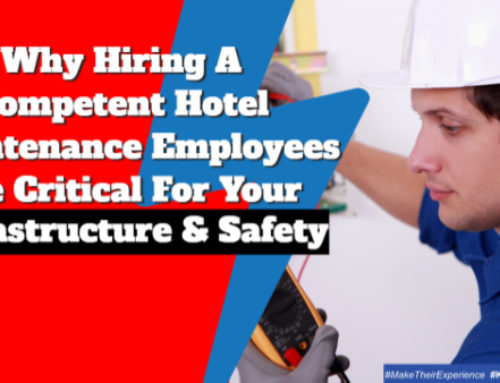.
.
Communicating is something we do every day but effective communication is not a skill we all process.
I will share common mistakes made and how you can improve.
Welcome to another edition of Hospitality Property School.
I am your instructor, Gerry MacPherson.
.
Introduction
Communication is something we do automatically- like breathing. We have been talking since we were small; talk to our partners, kids, and friends without giving it a thought.
.
It might seem easy, but effective communication actually takes quite a bit of skill.
.
Choosing the right words, listening with our minds instead of just our ears, and getting our message across are skills that we all need to work on.
.
When at home or with friends, not finding the right words or miscommunication can lead to problems or even arguments.
.
At work, the results could be much worse.
.
Unenthusiastic employees, poor productivity, even legal issues can be the result of bad communication skills.
.
This does not have to be a problem at your property if you incorporate a few changes to your communications practices.
.
.
Since the end of the last century, many companies have become dependent on e-mail as their primary source of communication with colleagues and outside clients.
.
Many of us have become so reliant on our computers and e-mail that we’ve neglected the art of effective communication. E-mail does have its advantages over the old-fashioned “snail mail” letters because they are quick and direct and they do leave a trail of your correspondents, but unfortunately for many, the desire for speed has almost created a whole new language of short sentences and abbreviations.
.
Have you ever sent off an e-mail with the best intentions only to have that misunderstood at the other end?
.
An e-mail sent quickly can easily be misinterpreted as a lack of caring, or worse a sign that you’re mad.
.
When speaking to someone face to face, a conversation is more than words itself. It’s the tone of voice, facial expressions and body language.
.
Take body gestures and smiles out of the equation, and recipients can easily get the wrong idea, especially when the sender isn’t the most coherent writer.
.
 |
Books with Tips & Strategies for Your Hotel, Resort, Inn,
|
.
- When sending an e-mail, writing a letter or even a note, I use spell check. And after you have used spell check, have someone else read it.
I can almost guarantee you’ll find mistakes in this book, even though spell check has been used and was reread by an editor, so it’s not a good idea to trust your own abilities alone.
.
- Don’t send messages with all caps, recipients might feel like you’re YELLING!
.
- Please, please, please use complete sentences.
.
- Organize your inbox, making sure priority messages are dealt with immediately. Use folders to priories. Missing important emails could cost you money.
.
- Check to make sure everything is clear. A good clear message can build engagement, prevent problems and streamline efforts.
.
- Have a standard communications schedule, here you can highlight import messages. Refrain from sending an e-mail every time you have a thought. This can become overwhelming clutter and import messages will be missed.
.
- Document. Document everything and make sure it is clear. When was the last time you said or one of your employees say “Didn’t I tell you?” or “Sorry, I forgot to mention” or “It’s supposed to be done this way”.
.
It is imperative to work together as a team and as a team, you will receive the same information. Check and recheck to make sure this is happening.
.
.
Handle Conflicts with Tact and Effective Communication
When you have more than two people working together 8 hours a day, day after day, week after week, month after month, year after year you’re going to eventually have some issues.
.
Minor issues will quite often take care of themselves, but those that blow into major issues can be very disruptive and stressful.
.
Any situation like this you want to nip in the bud immediately.
.
A good start is to let all employees know from day one your door is always open. You have to create a safe environment in which employees feel comfortable, to be honest, and openly voice their frustrations.
.
Encourage them to come to you with any problems and make sure all conversations held in your office remain completely confidential.
.
This is very important when responding to conflicts.
.
You have to be neutral and keep an open mind. Ask questions, and really listen to the answers so you understand how each person in the dispute feels.
.
Here, you can help the two parties reach a resolution that’s acceptable to everyone. If you have a policy in place in your operations manual for this type of situation use it. If the policy is to blame, change it and if there is no policy for this issue and you feel one is justified, add it.
.
.
Respect Cultural Variances
Our world is getting smaller and more and more hospitality properties are hiring foreign employees as well as receiving the guests from every corner of the planet. For this reason, property owners need to be more culturally sensitive and aware of the little differences in the way people of different nationalities interpret words and gestures.
.
It is so important to create an environment that is understanding, and sensitive to, the needs of employees and customers, no matter what the culture or religion.
.
I had one property owner once tell me that if his employees or guests do not like or could not deal with his beliefs, that was their problem.
.
Needless to say, he did not have many happy employees or a high return rate.
.
This is a wonderful topic to include in your training program.
.
.
Feedback is important
Praise for your employee is important. Just as important as praise is feedback. If you have employees working hard for you, tell them; and if you have employees who are not pulling their weight, tell them.
.
You don’t have to hold regular meetings to share feedback, you can let employees know what you’re thinking by e-mail, a phone call or the way I think works the best, in person.
.
When offering feedback be as clear as possible. If you’re giving praise, give specific examples. Most employees enjoy hearing details when they are doing something right.
.
And if there’s a problem, don’t just say “You’re not finishing your tasks on time”, offer a solution. You could say, “There seems to be a problem with your workload, what can we do to help?”
.
Talking down or being demeaning to a person is never the solution.
.
.
When to hold meetings
It is understandable that when operating a hospitality property unless closed for the season, holding staff meetings with everybody in attendance, is almost impossible.
.
So what’s the solution?
.
A short note that every morning might work. It could state how many guests arriving; any VIP’s (very important person/ persons) who might be on the property; any events taking place; menu specials or any product specials.
.
I cannot emphasize this enough, unless it is an emergency or highly confidential, you should not hold a meeting with an employee in your office.
.
You’re the face of your property, you have to be out and about as much as possible talking with your guests. So with this in mind, if you have to meet with an employee, go to where they are.
.
This way you can share the information you need to share, watch how things are going and you’re not taking that employee away from their duties.
.
If you want to keep good open effective communication with your employees, make them feel like owners.
.
If you have utilized the proper hiring process and have incorporated step-by-step and ongoing training, then it should be obvious to your employees that you have a vested interest in them and at this point, employees should have invested interest in your property. So don’t stop there.
.
If you have major decisions that have to been made about your property and will affect your employees, let them have a say before a decision is made.
For example:
major renovations, group insurance, policy changes for the operations manual.
.
Make sure you educate them on all aspects of the decision but then let them have a vote.
.
You might be thinking “wait a minute, this is my business” but think about it. If your employees see that you value their opinions, they will feel like they have more of a vested interest in the business and reward you with incredible loyalty.
.
Be open with them on how business is going.
.
If bookings are great and revenue is up, tell them. If things are slow, tell them that as well.
.
You might be feeling that you’re giving up control when in actual fact, it has been proven many times, and employees that feel they have a vested interest will work harder for your success.
.
It’s all about open effective communication.
.
.
Emotions on the job can be a killer
Being friends with your employees is great, letting them know they can talk to you at any time is very important but what is also very important is that you’re the boss. You are running a business, this is your livelihood; you have to be professional.
.
With any independent operation and different personalities, this can be really difficult.
.
If an employee, for some reason is not happy and starts making negative conversations personal, there is a good chance you are going to feel irritated. This is the time to stop, take a step back, calm yourself down, don’t be emotional but instead professional.
.
When responding, don’t make it personal. Ask your employee to present their case in a clear, concise way and you listen.
.
Don’t say anything until they are finished.
.
Is this making sense? Let me know in the comments
When they’re finished, repeat their concerns to make sure it is clear. If they start to interrupt you, you can say “I’m sorry, I thought you’re finished” and then don’t say anything.
.
It is very difficult to have an argument if only one person is talking.
.
Once the problem is clear, offer solutions if you have them. If not, ask them what they would suggest.
.
If you remain calm and professional, most problems will quickly find an agreeable solution.
.
I mentioned when listening to a complaint or a discussion it is important for you to listen. Listening, sometimes is not that easy. To be a good listener actually takes practice. So how can you improve?
Challenge yourself!
Whenever you’re listing to a conversation, pretend there’s a test at the end and you will have to list the three most important items in that conversation.
.
It is not as easy as you would think.
.
With practice and the little time, it will soon become second nature.
.
Another way to know what you heard is to repeat what the person said. This is good for both the memory and clarification.
.
.
Have fun at work
Okay, you have excellent employees; they understand your business goals and objectives; they are well trained, following all these step-by-step procedures from your operations manual and you all enjoy open, clear and effective communications.
Is that all?
Even companies with the best intentions are sometimes monotonous.
Is there anything else you can do to enhance the work atmosphere?
Have fun!
The workday can be as fun as and as exciting as your company wants to make it.
.
Many successful hospitality property owners that I’ve talked to over the years have one thing in common, they enjoy what they do.
.
Not that every day is a barrel of laughs, but there is enough happiness generated over time to see them through the rough times.
.
.
In conclusion
Effective communication with your guests and employees is not a skill you can take lightly. Review the common mistakes made, how to handle conflicts and ways to improve and you will see an enhanced property experience.
.
.
What do you do to improve communication at your hospitality property?
Let me know in the comments.
.
.
You will have access to this post for six weeks before it gets locked in the “vault” for Hospitality Property School Group members only. When you see that we have something new, don’t mark it “Unread” or file it away in the belief you’ll read it later because you might miss your chance.
To see all the other valuable material you’d have access to as a member of the Hospitality Property School Group, check out the short video in the episode post-show notes.
.
.
In the next episode, I will talk about customer service.
.
.
That’s it for today’s episode,
Until next time, have a fun day.
PS. Make sure you’re signed up for INNsider Tips? You can find the link in the show notes.
.
.
⇒ TO READ OR LISTEN TO THIS EPISODE ON KEYSTONE HOSPITALITY PROPERTY DEVELOPMENT:
https://keystonehpd.com/ The-Ultimate-Guide-To-Effective-Communications-214
.
.
Get Your INNsider Tips
https://keystonehpd.com/Sign-up-for-INNsider-Tips
.
.
Join one of your private groups
https://keystonehpd.com/private-groups
.
.
Say hi on social:
Facebook: https://www.facebook.com/KeystoneHDC
.
Twitter: https://twitter.com/KeystoneHDC
.
Linkedin: https://www.linkedin.com/company/keystone-hospitality-development
.
.
Listen to The Hospitality Property School PODCAST here:
https://keystonehpd.com/itunes-podcast
.
https://www.spreaker.com/keystonehdc
.
.
YouTube
.
.
A Division of Keystone Hospitality Property Development







